
First female law firm
opens in Saudi Arabia
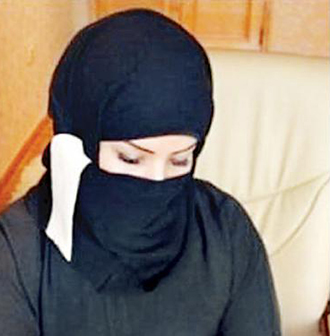 SAUDI
ARABIA: The country’s first female law firm
has opened its doors to protect women’s
rights in Saudi Arabia, two months after its
founder along with three other female
lawyers were granted licenses to practice
law in the traditionally patriarchal
kingdom.
SAUDI
ARABIA: The country’s first female law firm
has opened its doors to protect women’s
rights in Saudi Arabia, two months after its
founder along with three other female
lawyers were granted licenses to practice
law in the traditionally patriarchal
kingdom.
Now Saudi
women can seek help, advice and legal aid
from Bayan Mahmoud Al Zahran (pictured
left), the first Saudi woman lawyer who
launched the female law firm in Jeddah.
Zahran told
Arab News that her law firm is ready to
fight for the rights of Saudi women and
relate women’s cases to the court, a task
which her male counterparts at times cannot
understand or handle.
“I believe
women lawyers can contribute a lot to the
legal system. This law firm will make a
difference in the history of court cases and
female disputes in the Kingdom. I am very
hopeful and thank everyone who supported me
in taking this historical step,” Zahran
said.
The lawyer
also stressed that she is eager to work on
labor cases and business disputes involving
women but will work with both genders.
“Our
activity is not restricted to cases
involving only women. Saudi Arabia’s legal
system treats men and women equally and a
lawyer has the right to represent men and
women,” Zahran told Al Arabiya News
Channel on Thursday.
The launch
was attended by a number of Saudi officials
and members from the NGO community,
including Mazen Batterjee, vice president of
Jeddah Chamber of Commerce.
Batterjee
stressed the importance of Shariah law Saudi
courts, adding that female attorneys should
follow the restrictions of the court for
hijab while presenting themselves before a
judge.
Zahran’s father, Sheikh Mahmoud Al-Zahran,
praised his daughter’s efforts.
“We are
very proud of our daughter who stands firm
for protection of women’s rights. This will
help all women who couldn’t go and speak to
male lawyers about their problems,” he
said.
Zahran hopes
that her firm’s example will lead to more
female lawyers.
“This is a
very positive step toward the Saudi court
and justices as right now, we are four
female lawyers who got the license, but I am
hopeful that in future, the number will
increase,” she added.
Bayan Zahran, Jihan Qurban, Sarra Al Omari
and Ameera Quqani became the first female
legal representatives in Saudi Arabia in
October, when the country issues licenses,
allowing them to change their status from
legal consultants to attorneys, thus lifting
the ban imposed on female law graduates to
practice.
The initial plan of the justice ministry was
to allocate licenses to family status cases,
but the final decision did not impose any
limits on fields of law practice.
Conditions to obtain the license are the
same for men and women and include a
university degree in law and three years of
training.
Women in the ultra-conservative Kingdom of
Saudi Arabia usually maintain a traditional
place inside the household. Many details in
the lives of Saudi women are closely
regulated by Sharia law derived from the
Koran.

This is a
very
positive
step toward
the Saudi
court and
justices as
right now,
we are four
female
lawyers who
got the
license, but
I am hopeful
that in
future, the
number will
increase

Bayan
Mahmoud Al
Zahran
|
Every adult
woman is required to have a close male
relative as her ‘guardian’, who is
authorized to make a number of decisions on
a woman's behalf, including the right to
travel, to start a business, and study at
university. Saudi women are prohibited from
driving, and are required to cover
themselves in public, among other
restrictions.
Last October, Saudi women embarked on
unprecedented protest measure, by defying
kingdom's de facto ban on women driving by
getting behind the steering wheel.
As part of the October 26th Women's Driving
Campaign, around 60 women got behind their
vehicles, some brave enough have even posted
their experience on YouTube.
The declaration on the website
oct26driving.com has been signed by over
11,000 women.
“Physiological science and functional
medicine [found that driving] automatically
affects ovaries and rolls up the pelvis,”
Sheikh Saleh bin Saad al Luhaydan, judicial
and psychological consultant to the Gulf
Psychological Association, said in reaction
to the issue.
He added that the women who drive give birth
to children “with clinical disorders of
varying degrees.”
Many Saudis have expressed their anger in
Twitter, mocking the Sheikh’s “great
scientific discoveries.”
Source:
RT

‘Fashionable’ Hijab Lures
Indonesians
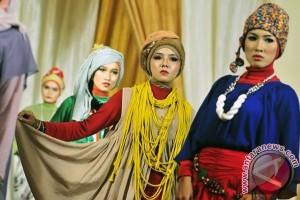
JAKARTA – Attracting a growing number of
Indonesian women, fashionable and colorful
Islamic headscarf is gaining ground in the
southern Asian archipelago, seeing hijab not
only as a religious commitment, but also a
fashion statement.
"The hijabs are all cute and I can’t resist
buying them,” Fani, a 29 years old employee
of an insurance company, told Antara News on
Saturday, December 28.
“Some of the hijabs I've bought I have not
yet even worn," she said.
Like many Indonesian young women, Fani, who
lives in Bandung city, West Java province,
shares a love for hijab fashion.
Satisfying her passion, she spends Rp300,000
(around US$35) per month to purchase hijabs
and accessories.
According to Fani, every month there are
new, trendy hijabs being displayed in
stores. Hence, she often spends one day a
month to go hunting for fashionable hijabs
in malls or shopping centers in her town.
Twenty years ago, Indonesian women only knew
square-shaped headscarves, in either plain
black or white.
Women used also to wrap their headscarves in
a simple way, putting a safety pin to keep
it intact.
Wearing headscarves was often associated
with an unfashionable life.
This has all changes nowadays.
In modern Indonesia, hijab turned to be a
fashion item, as Youtube viewers can find
thousands of Indonesian women offering
tutorials on how to fashionably wear hijabs.
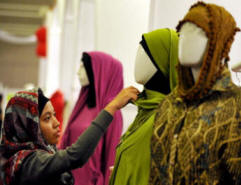 Islam
sees hijab as an obligatory code of dress,
not a religious symbol displaying one’s
affiliations. Islamic fashion is part of a
growing appetite for Shari`ah-related
industries and assets, ranging from finance
to halal food.
Islam
sees hijab as an obligatory code of dress,
not a religious symbol displaying one’s
affiliations. Islamic fashion is part of a
growing appetite for Shari`ah-related
industries and assets, ranging from finance
to halal food.
Modesty and religion are the cornerstones
behind the fast-growing Islamic fashion
industry, which is making a mark on runways
from Indonesia and Dubai to Monte Carlo.
Shops no more
Over the past few years, the hijab sales
have exceeded retail stores, with website
and social media replacing them.
Apart from profits for manufacturers, the
hijab trend also brings out new celebrities
who gained fame due to their style of
wearing hijabs.
Personalities such as Dian Pelangi, Hanna
Faridl and Fifi Alvianto are well-known for
their stylish and chic fashion while wearing
hijabs.
“In the end, the importance of wearing
hijabs is that it is not only a symbol of
modesty, it’s about being able to put
yourself in a positive state of mind and
make the right decisions,” Fifi wrote on her
blog, hijab-scarf.com, viewed by 4 million
people.
“Modesty comes from within, and even a woman
wearing a hijab can have a lack of it.”
Indonesia is the most populous Muslim state
where Muslims make up 86.1 percent of
Indonesia's 235 million population.
Source:
OnIslam

What’s the deal with
British Muslims?
Blog by Ghulam
Esposito Hayday
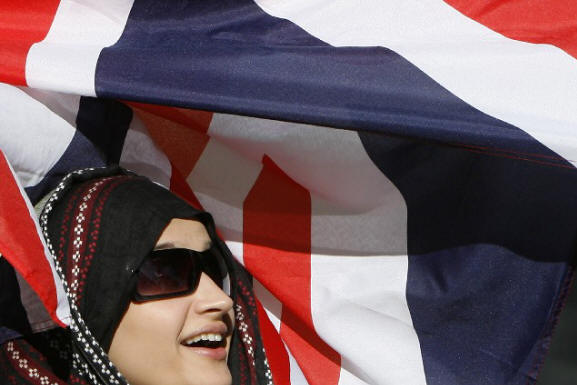
UK: I recently had the
opportunity to spend ten days with a large
group of international Muslims, the majority
haling from North America. One the things
that really struck me was their level of
maturity when it comes to working together
with Muslims and non Muslims who hold
different beliefs and ideas on communal
issues. The ability to put aside these
differences for the good of the community
really impressed me.
The main problem that inflicts British
Muslims is this partisan cultural monolithic
understanding of Islam imported from abroad.
You’d think that mixing with other Muslims
and becoming educated would eradicate this
trail of thinking but it hasn’t. In some
places, this problem is worse within the
second generation of British Muslims.
I was once asked by BBC Radio
5 Live to analyse and critique the results
from a live beat poll they conducted on the
perception of Muslims and Islam. Their
results demonstrated that a high number of
18-24 year old British non Muslims held
extremely negative views about Islam &
Muslims.
For too
long, good
hearted well
educated
practising
Muslims have
allowed
thuggish
Muslims or
those who
wish to do
harm to
Islam do our
PR for us.
|
When I was asked to give my opinions, my
first point was to allocate a portion of the
blame to the British Muslim community
itself.
For too long, good hearted
well educated practising Muslims have
allowed thuggish Muslims or those who wish
to do harm to Islam do our PR for us.
We’ve also generally kept
ourselves to ourselves and haven’t really
benefited the people around us a group.
Of course, we have to
recognise the reality that immigrant Muslims
who came to Britain in the 50s, 60s, 70s and
80s had different priorities; to become
financially stable. Engagement, education
and Daw’ah wasn’t the priority.
They lived together in areas
creating ghettos to make lives easier for
themselves along with clinging to their
culture since they held a belief that they’d
return home one day. It hasn’t worked out
this way and a consequence of this has
resulted in a ‘them and us’ type of
attitude, something that has carried over to
the following generation. The second
generation haven’t been able to associate
with Britain.
There is an identity crisis
and they really don’t know what to do. Many
of them still reside in these pockets of
majority Muslim areas shut of from the rest
of the community, mixing only when it is
absolutely necessary.


Islam to become Ireland's
second religion by 2043
|
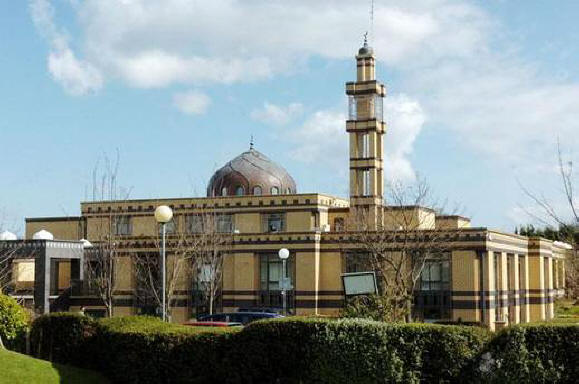
There are
several large Islamic centres around
Ireland, including this one in Clonskeagh,
Dublin.
|
EIRE: ISLAM
will become Ireland’s second religion within
the next 30 years because of dramatic
population growth and immigration.
The
revelation came as construction work is
expected to begin next year on Ireland’s
largest mosque.
The Clongriffin centre, on Dublin’s
northside, will be the largest Islamic
religious complex in the State and will also
boast a major cultural centre.
An Bord Pleanala earlier this year granted
planning permission for the three-storey
complex, which is earmarked for a six-acre
site owned by developer Gerry Gannon.
Costing more than €40m, the mosque complex
will be able to cater for more than 3,000
people and will feature two minarets, a
prayer hall, a cultural centre, offices,
bookshop, a library, a mortuary, a creche, a
600-seat events centre, school, a
state-of-the-art fitness centre, and
apartment blocks.
The entire complex will be 5,573sqm in size
and will be able to cater for 600
worshippers for Friday prayers.
Population statistics compiled by the
Central Statistics Office confirmed that
Islam is now Ireland’s fastest-growing
religion and, at its current rate of
expansion, it is set to become the second
religion in the State after Catholicism by
2043.
In 1991, Islam accounted for just 0.1pc of
the Irish population. That soared to 1.1pc –
a 10-fold increase – by 2011, when a total
of 49,204 Muslims were resident in Ireland.
Census
While there are indications the growth rate
has slowed to 70pc between 2002 and 2006, a
strong birth rate and immigration are
expected to result in
Ireland’s Muslim population exceeding
100,000 by 2020.
However, figures are not available for the
population breakdown between the Shi’ite and
Sunni branches of Islam.
The latest Census figures also revealed that
84pc of the Irish population describe
themselves as Catholic, down from 91.6pc in
the 1991 census.
The second fastest growing religion in
Ireland is Orthodox Christianity, where
numbers have doubled in the space of five
years, rising to 45,223 in 2011. This is
almost entirely down to immigration from the
former Soviet bloc states where Orthodox
Christianity is dominant.
The Protestant religions accounted for some
5pc of the population, dramatically down on
figures from 1900-1920. But the good news
for the Church of Ireland is that its
overall population in the Republic is
increasing by its greatest rate for almost a
century with 129,039 Church of Ireland
members in April 2011, an increase of 6.4pc
in just five years.
The number of Irish people with no religion,
atheists and agnostics, increased by 400pc
in Ireland between 1991 and 2011 to a total
of 277,237. This group included 14,769
primary school-aged children and 14,478 of
secondary school age. There were 4,690
children aged under one year who had no
religion.
Source:
Irish Independent
|

The US should encourage
Arabic language students, not criminalise
them
US: In August of 2009,
Nicholas George boarded a flight from
Philadelphia to Los Angeles. He was on his
way back to university at Pomona College.
While he was going through airport security,
a Transportation Security Administration
(TSA) agent discovered Arabic language
flashcards in his carry-on luggage.
He was pulled aside, detained and
interrogated for five hours – two of which
were allegedly spent in handcuffs.
"Do you know who did 9/11?" one of the TSA
agents allegedly asked.
"Osama bin Laden," George responded.
"Do you know what language he spoke?"
"Arabic"
"Do you see why these cards are suspicious?"
Nicholas George was released when it became
clear that neither he nor his flashcards
posed a threat to US national security.
George went on to try to sue the
Transportation Security Administration (TSA)
and Federal Bureau of Investigation (FBI)
for violating his first and fifth amendment
rights. Last week –more than four years
after the incident – the case was dismissed.
In other words, it is legal and legitimate
to detain and interrogate a traveller on the
grounds of suspicion from Arabic language
flashcards alone.
As an Arab-American who came of age
post-9/11, I am frustratingly resigned to
the well-documented fact that airports are
often hostile places for Arab and
Muslim-Americans. Watching my white father
effortlessly glide through airport security
while my brown mother is frequently
"randomly selected" to be stopped, searched
and asked to show the contents of her bag is
evidence of this in and of itself. However,
detaining a traveller for Arabic language
flashcards brings this flagrant racism and
criminalization of all things Arab, Middle
Eastern and Muslim (as the three are often
conflated) to a whole new level.
Nevertheless it is hardly surprising. Since
the September 11 attacks on the World Trade
Center and the official declaration of the
war on terror, it has become more and more
common for high schools to offer Arabic
language elective courses instructed along
the lines of "know your enemy" rather than
as a means to foster a cultural connection.

The Guardian
|